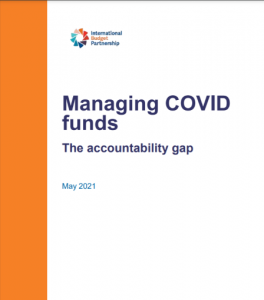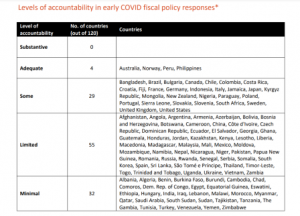How Accountable was the Indian Government with Covid-19 Funds?
A transparency and accountability study of 120 countries regarding funds expedited to fight Covid-19 ranked India in the lowest cohort, with 31 others.
Indian government’s accountability amid the Covid-19 crisis has been ‘minimal’, reveals a recently published report that has documented the accountability gap in Covid budgets across 120 countries. India fares in the lowest bracket of ‘minimal accountability’ with 31 other countries, including Cambodia, Egypt, Iraq, and Myanmar, among others. The neighboring countries of Nepal, Pakistan, and Bangladesh fare in comparatively higher brackets, and as per the report of the International Budget Partnership, have shown more accountability than India towards their Covid-19 budgets.
report that has documented the accountability gap in Covid budgets across 120 countries. India fares in the lowest bracket of ‘minimal accountability’ with 31 other countries, including Cambodia, Egypt, Iraq, and Myanmar, among others. The neighboring countries of Nepal, Pakistan, and Bangladesh fare in comparatively higher brackets, and as per the report of the International Budget Partnership, have shown more accountability than India towards their Covid-19 budgets.
The report studied policies introduced by several governments between March and September 2020 and analyzed the levels of transparency in the budgetary expenditure towards containing the virus. “By the end of 2020, governments mobilized a staggering 14 trillion dollars in fiscal policy responses. However, a chorus of voices also urged governments to put in place transparency and accountability arrangements necessary to ensure that the massive resources being mobilized did not go to waste. Responding to the crisis in an open and accountable manner was a way for governments to restore public trust and build back better,” said Vivek Kumar, Senior Director of Policy at IBP.
The research focused on three pillars of fiscal accountability: public access to budget information, adequate budget oversight arrangements, and opportunities for public engagement in budgeting. These pillars are essential to ensure that public funds are used effectively.
Also Read : Sustainable Development Agenda: Role of Parliaments
The report lists that three packages were introduced by the government of India in response to the pandemic:
1) Pradhan Mantri Gareeb Kalyan Yojana (March 26, 2020)
2) Atmanirbhar Bharat Package (May 12, 2020)
3) Atmanirbhar Bharat Package 3.0 (November 12, 2020)
The emergency fiscal policy packages were released in phases. The Atmanirbhar Bharat Package, the biggest fiscal policy relief measure introduced by GOI, was released in 5 tranches laid out over 5 days through 5 presentations. “Atmanirbhar Bharat package has been positioned as a campaign to make India self-reliant. A mix of fiscal and monetary, the policies are designed to aid domestic demand, encourage investment in MSMEs, boost manufacturing and infrastructure, production linked incentive schemes to improve efficiency,” the report reads.
While information about the disbursement of funds under the said packages is available on official websites of the government, no reports or documents have been made available by the government to document corruption, practices of misuse, or resource wastage that may have occurred in the process. “The government also did not release information on the revenue, expenditure, debt projections until it released the budget for 2021-22 in February 2021.”
The report also states that civil society organizations did not have the opportunity to participate in the formulation or approval of the said relief measures. The government also did not publish information about actual procurement related to the implementation of the emergency fiscal policy package under consideration (which may have included information on tenders, contracts, suppliers, payments, implementation, etc.).
IBP’s assessment further shows that more than 2/3rd of surveyed governments fell short of managing their fiscal responses in a transparent and accountable manner, thereby jeopardizing the effectiveness and impact of their responses to the crisis. It also concluded that governments failed to adopt key measures to enhance accountability that many voices had demanded. Only in about 1/4th of countries assessed by the IBP were auditors able to produce and publish audit reports on covid fiscal packages before the end of 2020.
As per the IBP, only four countries (Peru, Norway, Australia, and Philippines) were able to provide adequate accountability to their citizens. Only three countries conducted a gender-based impact assessment of their policies (Canada, Sweden, Philippines).
Also Read : Budget 2021: Government’s Allocation on Social Sector and Job Creation
The report also gave instances of good, accountable practices. In Australia and Bangladesh, extensive reports were published that detailed the implementation of specific policy measures and their impact on various disadvantaged groups, including women, the elderly, children, and those living in poverty. In South Africa, the ‘Asivikelane initiative’ gave an active voice to informal settlement residents in major cities who faced severe basic service shortages during the COVID-19 crisis. “Through targeted advocacy and campaigns, the initiative has already secured improved access to water, sanitation, and waste removal services from municipal governments affecting more than one million people; most recently, the group has entered into an unprecedented formal partnership with the government,” the report reads.
In Philippines, two laws were introduced to deal with the crisis, one of which demanded the government to publish weekly reports of their Covid-19 response and share them with the public, including an official committee that conducted a results-based assessment. Michael Aguinaldo, the in-charge of the Philippines’ Commission on Audit, said that the national government came up with guidelines on how to audit Covid fund expenditures. “We decided to look at the money flow in real-time, even though it was difficult to do it in a crisis that consists of life and death situations. We found ourselves in government hospitals that already had their hands full. But we were able to anticipate the money trail from the beginning, and so we looked at disbursements and release of funds since the beginning,” he added.
Carolina Renteria of the International Monetary Fund said, “At the very beginning of the pandemic, we told all governments to do whatever they had to do to save lives, but keep their receipts.” This, she added, is essential, for governments to make themselves accountable in a time of crisis that demands decisions to be taken at a rapid speed.
The IBP further recommended that in order for governments to be more transparent and accountable, they need to publish monthly reports on policy implementation, disclose details related to procurement contracts, empower audit authorities, restore the role of legislatures as the keepers of the public purse, and provide mechanisms for increased citizen participation.
